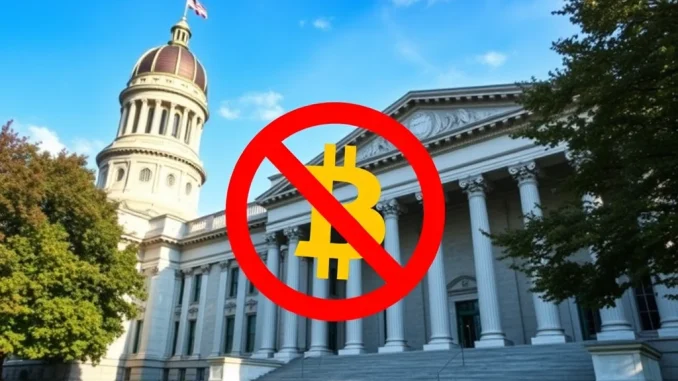
The world of cryptocurrency policy saw a significant development recently as the U.S. state of Connecticut moved to restrict its exposure to digital assets. News broke via WhaleWire CEO Jacob King on X that Connecticut has passed legislation that explicitly bans the state from holding or investing in Bitcoin or any other form of cryptocurrency. This decision marks a clear stance from the state government on the risks associated with volatile digital markets, impacting discussions around state crypto investment across the nation.
Understanding the Connecticut Crypto Ban
What exactly does this new Connecticut law entail? At its core, the legislation prohibits state funds, including pension funds and treasury holdings, from being used to purchase, hold, or invest in cryptocurrencies. This move is a preventative measure, designed to shield state finances from the inherent volatility and regulatory uncertainty often associated with the crypto market. While the specifics of the bill’s language are crucial, the intent is clear: keep state coffers out of crypto.
The passing of this bill positions Connecticut among states taking a cautious, if not outright restrictive, approach to digital assets regarding public funds. It reflects a broader debate happening at various levels of government in the U.S. about the appropriate role, if any, for public entities in the cryptocurrency space.
Why the Ban? Examining the Reasons
States considering or enacting bans like the Connecticut crypto ban typically cite several key concerns:
- **Volatility:** Cryptocurrencies are known for dramatic price swings, posing a risk to stable state financial planning and pension obligations.
- **Regulatory Uncertainty:** The lack of a clear, comprehensive federal regulatory framework for crypto makes state-level involvement feel risky and unpredictable.
- **Security Risks:** Concerns about hacking, fraud, and the security of digital wallets holding state assets.
- **Lack of Tangible Value:** Some policymakers remain skeptical about the underlying value and long-term stability of cryptocurrencies compared to traditional assets.
- **Public Trust:** Ensuring public funds are managed conservatively and transparently, avoiding speculative investments that could lead to losses.
These factors likely played a significant role in Connecticut’s decision-making process, prioritizing financial stability and risk aversion over potential high returns offered by crypto markets.
The Broader Landscape: Crypto Regulation US
Connecticut’s action is not happening in a vacuum. Discussions around crypto regulation US are intensifying at both federal and state levels. While Congress debates potential frameworks for stablecoins, exchanges, and market oversight, individual states are also taking varied approaches:
Some states are exploring ways to embrace blockchain technology and even attract crypto businesses, viewing them as drivers of innovation and economic growth. Others, like Connecticut, are focusing on consumer protection and financial stability, leading to restrictive measures, particularly concerning state funds.
This patchwork of state-level approaches highlights the ongoing challenge of regulating a globally interconnected digital asset class within a federal system. It also means that businesses and individuals involved in crypto must navigate a complex and sometimes contradictory legal environment depending on their location.
What Does This Mean for Bitcoin Investment Ban Discussions?
While the bill covers all cryptocurrencies, the mention of Bitcoin is significant. As the largest and most well-known cryptocurrency, a Bitcoin investment ban by a state carries symbolic weight. It signals that even the most established digital asset is considered too risky for public funds in Connecticut.
This move could influence discussions in other states or even at the federal level regarding how public pension funds or state treasuries should approach digital assets. It reinforces the view held by some traditional financial managers that cryptocurrencies remain outside the acceptable risk parameters for fiduciary duties involving public money.
Implications of Government Crypto Policy
The government crypto policy enacted by Connecticut has several potential implications:
- **For State Finances:** Ensures stability by avoiding exposure to crypto market volatility, but potentially misses out on significant growth opportunities if crypto performs well long-term.
- **For the Crypto Industry:** While likely not a major blow given state funds are only one type of potential institutional investor, it represents a setback in broader government adoption and legitimization.
- **For Citizens:** State pension funds are meant to be secure for public employees’ retirements. This policy aims to protect those funds from speculative losses, aligning with a conservative management philosophy.
- **Signaling Effect:** Could encourage other states with similar risk-averse financial strategies to consider comparable bans.
This decision underscores that while private investment in crypto is widespread, public sector involvement faces much higher scrutiny and a lower tolerance for risk.
Summary: A Clear Stance on Risk
Connecticut’s decision to pass legislation banning state investment in Bitcoin and other cryptocurrencies sends a clear message: the state prioritizes financial stability and risk avoidance for its public funds over potential gains from volatile digital assets. This Connecticut crypto ban reflects ongoing national debates around crypto regulation US and the appropriate role of public entities in the digital asset space. While private investment continues, this specific government crypto policy highlights the significant hurdles cryptocurrencies face in gaining acceptance within conservative public financial management frameworks, reinforcing the cautious approach many jurisdictions are taking regarding a potential Bitcoin investment ban for state portfolios.



